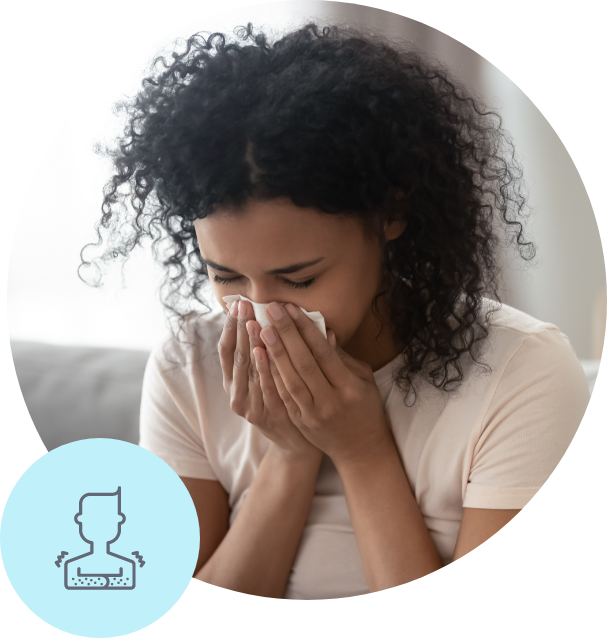Allergies
Allergies can interrupt your daily life, especially when the symptoms seem to linger throughout the day and night. Whether you are dealing with food sensitivities or upper respiratory allergies after COVID, you are likely seeking answers to stop this discomfort.
At CovidEMT, our telehealth team specializes in medical treatments for patients suffering from long-hauler symptoms. Allergies are one common issue that Covid patients often face. Here are a few things you need to know about ongoing allergy symptoms – and available treatment options.

Post-Covid Allergy Symptoms
Allergy symptoms after Covid are similar to typical allergy symptoms. It’s possible that these symptoms might be related to mast cell activation syndrome (MCAS), causing an inflammatory response and overproduction of histamine. Repeated exposure to allergy triggers could cause serious health issues, which is why it’s important for patients to work with a specialist for diagnosis and treatment.
If you are experiencing food allergies, then your symptoms might include:
- Hives
- Diarrhea
- Vomiting
- Upset stomach
- Abdominal pain
- Rashes
- Itching or tingling in the mouth
- Swelling in the face or throat
- Difficulty swallowing
- Dizziness or lightheadedness
- Shortness of breath or wheezing
Or, your allergy symptoms might be related to upper respiratory issues, with symptoms such as:
- Runny nose
- Postnasal drip
- Congested sinuses
- Earaches
- Sneezing
- Coughing
- Watery eyes
- Tenderness in the forehead or cheeks
- Hives or rashes
If you are recovering from Covid and experiencing any of these symptoms, consider talking to a post-Covid specialist for diagnosis and a personalized treatment plan.
Allergy Treatment Options
Researchers are still looking for a way to “cure” allergies, which means that treatments usually focus on managing symptoms and minimizing your exposure to allergy triggers. First, our medical team can complete thorough testing to determine any underlying allergy causes. Then, we’ll customize your treatment plan to reduce or eliminate symptoms.
For example, food allergy testing can be done to determine the ingredients that are causing your sensitivities. Many patients feel better after cutting out these offenders. In addition, we can help you design an ideal meal plan that keeps you full and satisfied without the ingredients that are triggering your allergies.
With upper respiratory allergies, many post-Covid patients have benefitted from antihistamines to manage the reactions and minimize symptoms. These daily-use medications can be a proactive way to stop the inflammatory response so that you start feeling better. Other medical treatments can also be discussed with your provider.
Regardless of the type of allergy symptoms you are experiencing, consider tracking your symptoms with a journal. Write down the symptoms that are occurring and the severity of your symptoms. Also, keep track of the food or other triggers that might have contributed to the flare-up. Identifying these triggers is the first step so you can make lifestyle changes to minimize exposure to triggers as much as possible.